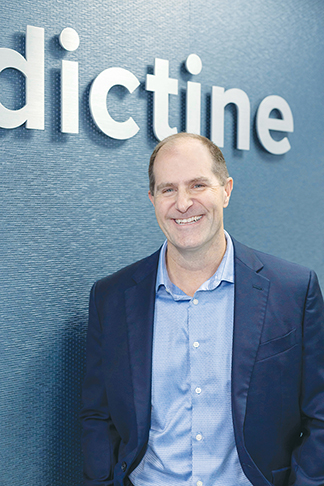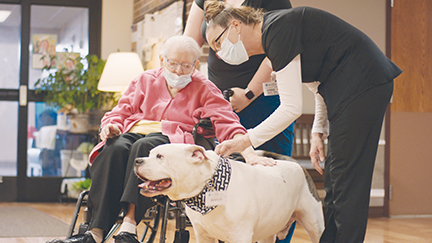By LISA EISENHAUER
 Jerry Carley, president and chief executive of Benedictine, at his office in suburban Minneapolis. He says state and federal support is needed to help nursing homes attract staff.
Jerry Carley, president and chief executive of Benedictine, at his office in suburban Minneapolis. He says state and federal support is needed to help nursing homes attract staff.MINNEAPOLIS — Jerry Carley, president and chief executive of Minnesota-based Benedictine, says the challenges brought on by COVID-19 are far from over for skilled nursing care facilities and nursing homes, even as the national emergencies
around the pandemic end.
Carley says regulatory demands and workforce pressures are putting the squeeze on a segment of health care that already was shrinking despite strong demand for its services. In an interview in mid-April with Catholic Health World and a brief
follow-up conversation in early May, Carley talked about how Benedictine, which has more than 30 senior living communities in Minnesota, North Dakota, Iowa, Missouri and Illinois, is responding to the challenges. His comments have been edited for
length and clarity.
The Centers for Medicare & Medicaid Services announced revised COVID-related guidelines for nursing homes that take effect when the public health emergency ends May 11. What will change for nursing homes?
The main change is that for the most part operationally what we knew pre-COVID is going to go back into place. So all these rule waivers that were in place will cease to exist, essentially. For example, the three-day hospital rule that requires patients
to spend three consecutive inpatient days in a hospital before they qualify for Medicare coverage of skilled nursing care, that's coming back. But some of the requirements put in place during COVID are going away, too. One is the requirement for routine
COVID-19 testing of residents and staff. That ends at the end of the public health emergency.
We're still required to educate on and offer residents and staff the vaccine at least until May 21, 2024. Another continuing rule is that masks will still be required when there's been a potential exposure. And then there's also a requirement for reporting
items related to COVID, such as the vaccination status of residents and staff. That's going to go on forever, unless additional regulatory action is taken.
Is the new guidance appropriate and necessary in your opinion?
I think so. I think it's a good start to getting back to normal.
Are there any particular state or federal policies that could be revised or added that would make it easier for Benedictine to serve its communities?
There's no reason to bring back the three-day hospitalization rule. None. Medicare Advantage plans don't use it. The only payment source that uses it is Medicare. We have gone three years without it, but now the waivers are going away and it's going to
come back again.
I'm also questioning a little bit the requirements for CNA certifications within four months of hiring. We've gone three years without it. (CMS) waived that so that nursing homes could get workers into the buildings. We still need to get workers into
the buildings. But that waiver goes away at the end of the public health emergency.
How challenging has inflation and the push for higher wages been for Benedictine?
Minnesota since the pandemic has seen over 20 nursing homes close. Iowa has seen over 20 nursing homes close. What seems to be driving it is inflation, higher wages, use of agency staff and Medicaid and Medicare reimbursement methodologies that have not
kept up with those rising costs. There has been this gradual closing of nursing homes for the last 20 to 25 years, but this has really accelerated it. And I don't see an end in sight.
Benedictine has not had any closures. We're not anticipating any closures as a result of this, primarily because we have a diverse portfolio with assisted living and independent living, which is not necessarily limited by Medicaid and Medicare reimbursements.
They tend to be more private pay. The ones that are really struggling are the standalone skilled nursing facilities.
Are you able to meet the demand for beds from patients who need skilled nursing care?
 Bentley gets a pet from Sr. Bernadette Kostrzewski while on a visit to Benedictine Living Community-Crookston in northwestern Minnesota. His owner, Jennie Mason, right, has been on staff for 26 years. Masking requirements remain in place in nursing
homes when there has been potential COVID-19 exposure.
Bentley gets a pet from Sr. Bernadette Kostrzewski while on a visit to Benedictine Living Community-Crookston in northwestern Minnesota. His owner, Jennie Mason, right, has been on staff for 26 years. Masking requirements remain in place in nursing
homes when there has been potential COVID-19 exposure.We are not able to meet the demand because we do not have the staff to care for them. What has happened during this latter part of the pandemic, specifically the last year or so when we had the great resignation, is a lot of nursing homes started to either
limit or completely restrict admissions because they just simply didn't have the nurses or certified nursing assistants to care for them. The nursing homes are sitting 75% occupied. There's plenty of capacity, but the staff just aren't there.
Until we take a stand at the state level or the national level to increase and help with reimbursement methodologies that can get us to become competitive again in the workforce, that problem is not going to solve itself.
What is the breakdown on reimbursement nursing homes get from Medicare, Medicaid and private pay?
Depending on where you're at you could have care centers that are 70-80% Medicaid. In a couple of the states that we're in, Minnesota and North Dakota, there's rate equalization, which means that we can't charge private pay more than what we get reimbursed
from Medicaid. In other places, we can do that, so you can somewhat offset some of those costs by passing it on to the private pay.
There are still logjams in places with patients waiting to move from hospitals to long-term or rehabilitative care. Are you aware of efforts to address that?
We're actually seeing a couple of hospital systems that have reached out to us that said, "If we help pay for staff to supplement whatever the costs are for the agency workers, can we create these arrangements and agreements?" We're being innovative
and creative on how we are working in partnership with hospitals to help decompress their bed availability, because they're full. They need to discharge patients so they can admit people.
Has the staffing crisis eased since the height of the pandemic?
There's all kinds of graphs out there that show that the nursing home industry is the only sector in the United States that has not recovered to pre-pandemic employment levels. Everybody else has recovered to some degree and maybe even is doing a little bit better.
There's not the staff for us. I will hire you today to do whatever you want to do in one of our nursing homes. It's that dire and there's not a full understanding by our elected officials of how bad it is.
Is the nation ready to meet the needs of its aging population?
We can't meet it today. There's a fairly significant disconnect in what is happening. It was reiterated again this week with the Biden administration talking about staffing mandates. They are saying, "If you don't hit certain retention numbers, we're
going to reduce your Medicare reimbursement," which just makes it worse.
Developers are going to continue to build nice large private pay assisted living or independent living centers for those that can pay for it. But if we're not going to get adequate reimbursement for Medicaid and Medicare, we're not going to see that
side of the equation be developed.
We at Benedictine have zero plans for building any new nursing homes because the financial modeling doesn't work in its current environment, which is a challenge because that's part of our mission.
Are the needs and desires of people coming into long-term care today different from those in the past and, if so, is Benedictine adjusting its services or policies?
The needs and desires are much different. I've been doing this for over 30 years. When I got in this business, a lot of the nursing home residents then would be assisted living residents today. That's where there's been a shift.
We're moving much more heavily into assisted living and independent living, moving away from skilled nursing facilities. We're not going to fully move away from skilled nursing facilities because there's still a need there. But that need is so much
less today versus 30 years ago because of the assisted and independent living options.
A lot of eldercare providers are getting away from nursing homes just simply because of the regulatory environment and the punitive nature of that particular space. I think we're going to continue to see that shift going forward.